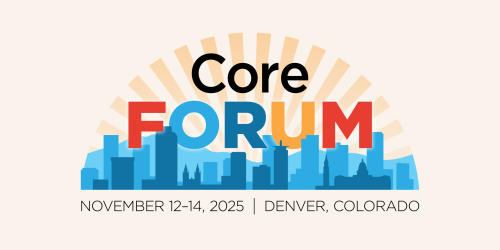
Core Forum is the annual conference for ALA’s newest division, Core: Leadership, Infrastructures, Futures. It brings together librarians and information providers in central roles of buildings & operations, leadership & management, metadata & collections, and technology. The conference focuses on six tracks or content areas:
- Access & Equity
- Buildings & Operations
- Leadership & Management
- Metadata & Collections
- Preservation
- Technology
Sandy
These are the highlights and takeaways from my first Core Forum:
In the opening general session, The Librarian’s Dividend: Pathways Towards Information Ethics and Literacy in the Age of Generative AI, Dr. Casey Fiesler shared the following take: the primary danger of artificial intelligence is the “Liar’s Dividend” and the antidote is the “Librarian’s Dividend.” The “Liar’s Dividend” is the benefit bad actors receive when the constant possibility of AI fabrication erodes confidence in what is real. This allows anything—even reality—to be dismissed as a “deepfake,” undermining trust in all information. The proposed countermeasure she offered: the “Librarian’s Dividend” which she defined as the social and ethical benefit derived from trusted, human curation and expertise in evaluating information. Discussing the broader economic impact of AI, the session noted a critical distinction: “AI is not taking people’s jobs; humans are firing them.” I.e., Technologies are just tools; people create the systems.
Radical Accessibility moves beyond compliance to belonging. The presentation from Multnomah County Library, Radical Accessibility: Building Belonging and Breaking Barriers, introduced the concept of Radical Accessibility in space design. While ADA Compliance is the legal baseline, and Universal Design focuses on choice, dignity, and comfort, Radical Accessibility aims for the goal of incorporating joy, belonging, and justice. This session offered very concrete examples of Radical Accessibility in practice (including written policies!), and the handout is worth downloading.
A trauma-informed approach isn’t just for patrons—it’s for staff. A poster session titled Turning the Page on Trauma demonstrated how one library applied the “four R’s of trauma-informed care” (Realize, Recognize, Respond, and Resist Re-traumatization) to its own staff. After experiencing collective trauma, this framework was used for internal healing. This model offers an antidote to burnout, built on the hard truth that “Healing from trauma doesn’t follow a set timeline.” Stay tuned for an upcoming workshop on applying the practices of trauma-informed care in libraries.
To move forward, focus on consent, not consensus. In a session on Knowledge Management, I was struck by a strategy to overcome team gridlock: focusing on consent, not consensus. According to the presenters, consensus requires everyone to agree, which often results in stalemates. Consent, however, allows a team to move forward, test, and iterate, requiring only that no one has a major, principled objection. I’ve often said that consensus doesn’t mean we all agree at the same level, but that we’re all willing to try something together. After this session, I realized that reframing around consent may be a more effective approach than my attempts to assert a more expansive definition of consensus.
Effective leaders prioritize character over competency. In the session, Competency vs Character: What Makes a Good Leader?, the presenter shared her research outcomes: the traditional focus on professional Competency (a role-specific skill developed to meet a predetermined standard) is evolving toward an emphasis on Character (a person-centric set of natural strengths and abilities). While shoring up weak competencies can be draining, leading from core character strengths is energizing and enhances performance. Is it time for another StrengthsFinder?
Finally, Melanie Yazzie’s general session, Tracing Memory and Making Change offered a look back on Yazzie’s experiences as an artist, teacher, Indigenous person, and member of the Navajo Nation, and her travels throughout the world. The visual storytelling was compelling, and her song offering during a large closing circle where attendees held hands, was a powerful shared moment during the conference.
Meghan
This was my first Core Forum experience and I was impressed with the variety of sessions & content areas. Here are my takeaways:
- The Librarian’s Dividend: Pathways Towards Information Ethics and Literacy in the Age of Generative AI, Dr. Casey Fiesler (University of Colorado Boulder)
Dr. Fiesler’s keynote was an impressive distillation of the impacts of GenAI in the information landscape (& as a contributor to information disorder), and an impassioned call to action for librarians to foster AI literacy and help people understand, critique, and navigate generative AI ethically and thoughtfully. A self proclaimed “buzzkill technology ethicist”, Dr. Fielser researches and teaches in the areas of technology ethics, internet law and policy, and online communities– and in addition to her scholarship and publications in the popular press, she works to critique and demystify AI through her TikTok channel. Her keynote was a wonderful kick off the conference and offered a lot of food for thought (& ideas/discussion topics for future LIB classes and one-shots).
- The Future of Knowledge Deserves to be More Than Artificial Intelligence Talking to Itself: Taking a Critical Lens to AI in the Library, Micah May (Lyrasis), Peter Musser (Institute for the Study of Knowledge Management in Education- ISKME), Brian Pichman (ByWater Solutions)
This panel discussion offered an exploration and critical examination of generative AI’s role in libraries and the broader ethical issues, risks, and limitations of reliance on machine-generated knowledge. Panelists emphasized that today’s dominant AI tools—ChatGPT, Claude, Copilot, Perplexity—are owned by large companies that collect user data with limited transparency, creating serious privacy, copyright, and mental-health risks. They highlighted the environmental cost of large models, noting that massive data centers consume extraordinary amounts of energy and water, often taken from local communities. Participants stressed that librarians are frequently “given” AI-enhanced products by vendors without clear opt-out options (Peter Musser stressed the principle of “opt-in” vs. “opt-out” a few times), training, or explanations, and urged colleagues to question vendors rigorously about data sources, model behavior, and long-term viability. In closing, panelists agreed that libraries should neither fully embrace nor reject AI, but instead learn, experiment, and prepare through a harm-reduction approach. They encouraged the library profession not to ignore AI (perhaps at their own peril), but instead help guide the public through this rapidly evolving sociotechnical landscape.
- Uncensored: Libraries’ Role in Protecting Intellectual Freedom, Kent Oliver (ALA Public Policy & Advocacy Office), Micah May (Lyrasis), Emma Karin Eriksson (Books Unbanned Project, Brooklyn Public Library)
Library and information professionals on this panel shared various projects and initiatives that they have led to help defend intellectual freedom amid growing pressures to censor. Emma Erickson from Brooklyn Public Library shared the Books Unbanned Project (founded in 2022), which provides teens nationwide with unrestricted access to a digital collection that includes access to frequently banned materials. The program has grown to include 5 partner library systems (San Diego, Boston, LA County, Seattle, Long Beach) and has received applications from all 50 states. Brooklyn Public Library alone has created over 10,000 applications to Books Unbanned and attained 1 million+ checkouts across all of the card holders. This is a tremendous effort to support the freedom to read, especially among (young adult) populations that are particularly impacted by book challenges and removals. An important clarification that was made during the presentation is that the Books Unbanned project is 100% privately funded (not funded with tax dollars)- and that the project has seen an increase in donations to BOTH the Brooklyn Public Library and the Books Unbanned program specifically since the start of this program.
- Expanding Ecological Literacy: Seed Libraries and Gardens at your Public Library, Rikki Longino (Salt Lake Public Library)
Rikki Longino shared how libraries can deepen their role in community sustainability by establishing seed libraries and on-site gardens. Through these projects, libraries become living, participatory spaces where patrons can access seeds, learn about local ecology, and grow plants — bridging environmental literacy, food security, and community engagement. Rikki offered practical guidance (and resources: slides Seed Library Network) for launching and maintaining seed-lending programs, including sourcing seeds, designing garden spaces, and building partnerships. The session also highlighted how these green initiatives help libraries foster resilience, support biodiversity (especially through native plants), and cultivate intergenerational learning around sustainability. It was inspiring to see libraries not just as repositories of information, but as proactive agents in ecological education. I’ve always thought developing a seed library and/or a seed swap event would be a wonderful opportunity for collaboration with the Campus Garden, Reynolda Gardens, and/or our partners with the Office of Sustainability!
Carolyn
Below are some of my takeaways from this year’s Core Forum.
- Conducting a Research Survey: An Education. I enjoy attending informational sessions in which Technical Services librarians discuss how they came up with ideas to conduct research and devised a plan to gather data on the questions they seek to answer. Diana Simpson, a Catalog Librarian at the University of Southern Mississippi, shared her experience and challenges she faced as a first-time survey researcher. Some of her advice to potential survey researchers included:
- Become curious about something in one’s everyday work
- Participate as a respondent in surveys—take notes, screenshots to assist in writing a future survey of one’s own
- Write small objectives and not try to find out everything
- It’s fine to repeat a study
- Participate in human subjects research training
- It takes practice to become good at constructing survey questions
- Define one’s target audience—ask qualifier questions early in survey to ensure you’re getting the target audience you want as participants
- Viewfinder: A Toolkit for Values-Driven AI in Libraries and Archives. Sara Mannheimer discussed her participation as a member of the IMLS-funded project team who created the Viewfinder toolkit, a resource developed to “support responsible use of AI in library and archives context.” With the inclusion of values and ethical considerations, the toolkit provides guidance to library professionals in responding to potential AI threats and reducing harm to the communities we serve. Following her presentation, Ms. Mannheimer led an exercise utilizing the toolkit in small groups of 2-3 attendees.
- Accuracy Matters: Evaluating the Value of AI Tools for Summaries in Metadata. Librarians from Illinois State University conducted a study comparing AI-created abstracts vs human-created abstracts from electronic theses and dissertations (ETDs) from six disciplines. Four of the six have completed evaluation; the other two are still in process. A rubric was developed to compare several aspects of the ETD summaries: relevance, completeness, clarity, and bias. Five abstracts were created for each ETD, and two grad students were employed to evaluate all abstracts. Per ETD, one abstract was written by the ETD’s author, and the other four were created via ChatGPT, Copilot, Gemini Flash, and Gemini Pro using prompts. For complete details on the methodology and findings of this study (and there were some interesting ones), check out the presenters’ PowerPoint slides. In their concluding PPT slide, the presenters suggested the following recommendations on using AI tools in cataloging metadata:
- Adopt an evaluate-first policy
- Communicate with vendors on AI tools and features in your systems
- Question their evaluations and human oversight mechanisms on AI outputs
- Pilot with purpose
- Define goal, success metrics, ethical guardrails, and accuracy threshold
- Document workload and oversight costs
- Reframe “innovation” as real resource allocation
- Ethical Issues in Cataloging Work: What Are They? Have They Changed? Why Does It Matter? Karen Snow and Beth Shoemaker reviewed their findings from their 2019 and 2024 studies of how catalogers perceive ethics in their work as well as ethical issues they confront while cataloging. For both studies, most survey respondents believed that there are indeed ethical issues in cataloging. Ethical issues most important to respondents included: personal bias, inclusive standards, systemic/harmful standards, quality cataloging, accessible resources, and outdated standards. This in-depth presentation was extremely informative, and the presenters’ PowerPoint slides are available for download to view further details.
Steve
Okay, I know I’m biased, because I’m the President-Elect of Core and have an interest in the success of the conference, but I think the 2025 Core Forum might have been the best conference going experience I’ve ever had. The combination of great programming I got to attend and the in-depth, meaningful conversations I got to have with members and leaders in the organization made it a unique and wonderful experience.
The folks above have covered some of the most memorable sessions I attended, including the two keynote presentations (The Librarian’s Dividend: Pathways Towards Information Ethics and Literacy in the Age of Generative AI and Tracing Memory and Making Change) and the session on fighting book bans (Uncensored: Libraries’ Role in Protecting Intellectual Freedom), so I won’t rehash those. Instead I’ll talk about a couple of others.
AI in Cataloging and Metadata: Developing Community and Best Practices – At this session, Kate James and Christine DeZelar-Tiedman, representatives of the Program for Cooperative Cataloging (PCC) discussed the work of a PCC task force that developed a set of best practices and guidelines for developing a community of practice for using AI in cataloging. Overall their recommendations tended towards careful consideration of how to move forward, while acknowledging that AI is coming no matter what we do. Their recommendations included starting out with a test project, rather than using AI for major wholesale changes, and familiarizing yourself with the ethical issues around AI. The presentation ended with four very handy pieces of advice on how to proceed with AI:
- First educate yourself about AI; don’t assume
- Consider potential AI uses in your work
- Consider benefits and risks of using AI in your work
- Accept change—technological, personal, etc.
“Storytelling as a Tool for Empowering Marginalized Communities: Enhancing Access and Equities in Libraries” – At this session, ALA President Sam Helmick led a stirring presentation/conversation about the importance of storytelling in libraries, both as a way for community members to express themselves and for libraries to demonstrate their vital importance to communities. If you’ve never seen Sam speak, they are a dynamic and engaging speaker. Sam shared a lot of personal stories, describing how they went from being a homeschooled child raised in a strictly religious household, who, at 18, opposed a local bond initiative to raise money for their local library, to being a dedicated librarian and eventually the President of ALA.
I was lucky enough to have dinner with Sam, along with Angie Ohler, the Past-President of Core and other long-time Core members, where we had a candid, in-depth conversation about Core’s relationship with, and place within, ALA. This was just one of several high level conversations about Core business I was able to have at the Core Forum, including co-leading a listening session with Angie on the development of a new strategic plan for Core. All in all, it was a very productive conference.



